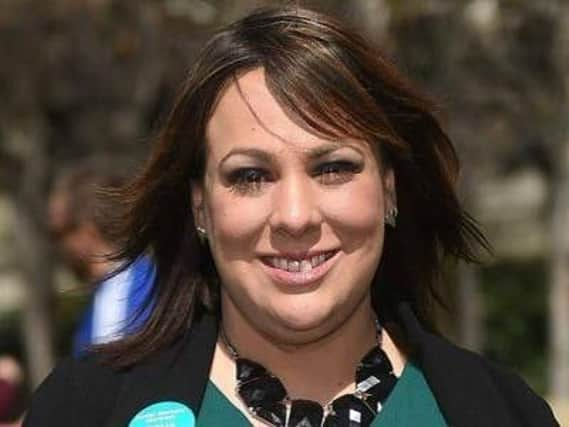Paula Sherriff interview: 'There were some tears when we recognised we probably wouldn't all be coming back'


“There was a sense among some of us in marginal seats that ‘this could be it’,” admits Paula Sherriff when asked about the recent election.
The 42-year-old had seized her Dewsbury constituency from the Tories by just 1,451 votes in 2015, and the chances of holding on to the seat this time round looked increasingly slim.
Advertisement
Hide AdAdvertisement
Hide Ad“A lot of us said goodbye to each other prior to the dissolution of Parliament.
“The 2015 intake of MPs are very close, and that was amplified when Jo [Cox] died... There were some tears and real moments of sadness when we recognised that we all probably wouldn’t be coming back.”
These fears proved unwarranted on June 9, when Sherriff was returned with an increased majority of 3,321.
This was in part down to an unexpected nation-wide surge in the Labour vote. But there is no denying that the former police support worker has built herself a strong reputation over the last two years as a politician who delivers.
Advertisement
Hide AdAdvertisement
Hide AdOne of her most highly-publicised successes has been a campaign to abolish higher taxes on sanitary products. In 2016, Sherriff became the first opposition backbencher to amend a government Budget when her motion to scrap the “Tampon Tax” gained cross-party support.
The MP describes this as one of her proudest achievements since coming to Parliament – not just because of the money it will save millions of women across the country, but also because it marks another step toward removing the stigma around many “women’s issues”.
As she puts it: “We’ve got the world talking about periods.... it thrills me that we got David Cameron to go and negotiate with the other 27 EU countries about tampons.”
There is a received wisdom for new MPs in Westminster that is takes around two years to find your feet in the job, as you come to terms with the complex rules and procedures that govern Parliament and get used to the adversarial nature of party politics.
Advertisement
Hide AdAdvertisement
Hide AdBut since her early days in the role Sherriff appears to have taken to professional politics with ease, never shying away from a confrontation or an opportunity to challenge those in power.
When asked about this, she states simply that “very little intimidates me”. She puts this down to a combination of age and a decade of service with the police.
“Working in the police is a great education for a young woman, because frankly I saw it all,” she says. “In some ways I still miss it; there’s something very special about working in the force, its a family.
“I became an MP when I was 40, so I’m very comfortable in myself and I’m very comfortable with my politics.
Advertisement
Hide AdAdvertisement
Hide Ad“I don’t have those quandaries in my head about whether what I’m doing is right or wrong. The battles I choose are things that mean a great deal to me.”
Despite serving as a local councillor, Sherriff claims she had never considered standing for Parliament until it was suggested to her in the run up to the 2015 election. She admits she initially had doubts about the prospect.
“There was a moment when I thought ‘people like me don’t become MPs. I was very much working class, very northern, and I’ve never gone to university,” she explains.
“But then, after a while,that was one of the things that energised me and motivated me to make it happen. I knew it would be tough to get elected, but here we are!”
Advertisement
Hide AdAdvertisement
Hide AdFollowing the murder of the Batley and Spen MP Jo Cox, Ms Sherriff has made a point of speaking out about the abuse and threats she has received, and the steps she has had to take to protect her own safety and that of her staff.
This has helped to buck a trend among politicians, many of whom have come to accept abuse as part of the job or worry that discussing them in public will only incite further criticism.
Sherriff acknowledges that to be an MP is to “work in a very divisive role” and this inevitably means some people “will criticise my opinions and criticise some of what I do”.
But she draws a line when threats get personal, and says her office adopts a “zero-tolerance” approach to such behaviour.
Advertisement
Hide AdAdvertisement
Hide Ad“It is a really worrying thing in society that’s going on at the moment, that people think they can just send MPs and people in positions of authority this terrible abuse. And I think social media has played a big part in that,” she says.
The MP is also highly critical of Conservative attempts to pin the blame for the rise in online abuse on left wing supporters. Although she accepts “there are people in my own party that do it”, she claims the abuse she gets “from the right and the far-right is absolutely horrendous”, adding: “It just seems that some on the right don’t accept that equally there is a problem within their own party or brand of politics.”
She goes on to reveal that her mother often expresses concern for her, sometimes urging her to rein in her views. “My mum has said to me on a couple of occasions ‘please be careful about taking on the far right because I don’t want them coming after you’,” she says.
“Despite the fact I’m 42 she’s very, very maternal and worries about me a lot.
“But I think she also accepts I’ve got a job to do.”